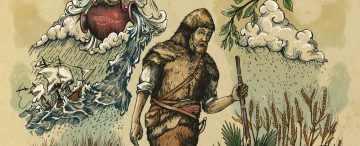Kirsten A. Hall at The New Atlantis:
 When Daniel Defoe published Robinson Crusoe three hundred years ago in 1719, it was an instant bestseller, and since that time it has not given up its hold on our imagination. The story of a man and his companion Friday, cast away on a Caribbean island, is as familiar to us as any fairy tale, even if we haven’t read the book. Like its footprint in the sand, Robinson Crusoe has left a sign on the cultural landscape, even giving its name to an entire genre known as the “Robinsonade” that includes novels like Treasure Island, The Swiss Family Robinson, and Lord of the Flies, and TV shows and films like Gilligan’s Island, Cast Away, and Lost.
When Daniel Defoe published Robinson Crusoe three hundred years ago in 1719, it was an instant bestseller, and since that time it has not given up its hold on our imagination. The story of a man and his companion Friday, cast away on a Caribbean island, is as familiar to us as any fairy tale, even if we haven’t read the book. Like its footprint in the sand, Robinson Crusoe has left a sign on the cultural landscape, even giving its name to an entire genre known as the “Robinsonade” that includes novels like Treasure Island, The Swiss Family Robinson, and Lord of the Flies, and TV shows and films like Gilligan’s Island, Cast Away, and Lost.
So what is it about Robinson Crusoe? Samuel Taylor Coleridge believed Defoe’s castaway was representative of “universal humanity.” Edgar Allan Poe wrote that the appeal of the novel lay in its power of our identification with its hero. Virginia Woolf wrote “there is no escaping him,” in the same way as there is no escaping the “cardinal points of perspective — God, man, Nature.” Others have explained the novel’s enduring popularity by pointing out how it sustains multiple interpretations.
more here.
